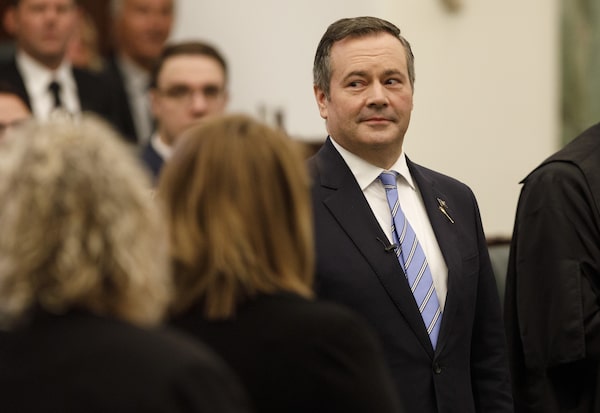
Alberta Premier Jason Kenney looks on as members are sworn in at the Alberta Legislature in Edmonton, Alta., on Tuesday, May 21, 2019. A source close to Mr. Kenney said the Premier will only campaign in Ontario if his participation is welcomed by the federal Conservatives.JASON FRANSON/The Canadian Press
Alberta Premier Jason Kenney will campaign in Ontario during this fall’s general election in an effort to convince new Canadians living in suburban ridings that Andrew Scheer’s Conservatives are a safe choice for their votes.
Mr. Kenney’s journey to the Ontario heartland is a remarkable intervention by a premier in a federal campaign, a move targeted at defeating Justin Trudeau’s Liberal government.
Premiers have involved themselves in federal elections in the past. Danny Williams, when he was Progressive Conservative premier of Newfoundland and Labrador, waged an Anything But Conservative campaign against Stephen Harper’s federal Conservatives during the 2008 election in a dispute over equalization formulas.
Liberal Kathleen Wynne, then-premier of Ontario, worked actively in 2015 to defeat Mr. Harper and to make Mr. Trudeau prime minister, going so far as to throw her party’s provincial machine into local fights to defeat both Conservative and New Democrat candidates.
But Mr. Kenney is taking a very different approach, according to a source close to the United Conservative Party Premier; The Globe and Mail granted them anonymity because they were not authorized to speak on the Premier’s behalf. Mr. Kenney will be inserting himself into what is known as the 905: the large swath of seats outside Toronto, named after its area code, whose millions of voters often determine the outcome of federal elections.
In many of those ridings, immigrant Canadians make up a majority or a large minority of voters. As immigration minister in the Harper government from 2008 to 2013, Mr. Kenney worked tirelessly and successfully to convince immigrant voters, many of whom are socially and economically conservative in outlook, that the federal Conservative Party best reflected their values.
A swing by 905 voters away from the Liberals delivered a strong minority government for the Conservatives in the 2008 election and a majority in 2011. But many of those same voters abandoned Mr. Harper for Mr. Trudeau in 2015, helping to deliver a majority government for the Liberals.
In a statement to The Globe on Wednesday, Mr. Kenney reiterated his hope that the Liberals would modify their positions on pipeline approvals and carbon taxes. However, if the Liberals do not reverse these policies, he said, “I will openly and vocally campaign here in Alberta and wherever I can make a difference across Canada to elect a Conservative government that will stand up for Alberta and for Canada.
"As I said many times during the recent [provincial] election campaign, if the Trudeau government continues with the destructive policies that undermine Alberta’s vital economic interests and put Albertans out of work, the impact on our province will be disastrous,” he said. "If Trudeau’s policies don’t change, then the federal government needs to.”
The new Alberta Premier has many bones to pick with Mr. Trudeau’s Liberals. In the Throne Speech delivered by Lieutenant-Governor Lois Mitchell Wednesday, the new government vowed to immediately scrap the carbon tax enacted by the previous NDP government of Rachel Notley. The Liberals have imposed a federal tax on any province that does not put a price on carbon. The tax is one reason Ontario Progressive Conservative Premier Doug Ford will also be campaigning to unseat Liberals in the next general election.
Mr. Kenney is also incensed by Bill C-69, which would impose stricter environmental conditions on proposed infrastructure-projects, including new pipelines, and Bill C-48, which would ban tanker traffic along British Columbia’s north coast. Both bills have been passed by the House of Commons and are currently before the Senate.
The federal Liberals have accused the federal Conservatives of catering to nativist voters, pointing to a pro-pipeline rally that Mr. Scheer attended at which far-right-wing activist Faith Goldy was also present, along with “yellow vest” protesters, many of whom oppose Canada’s open-door immigration policies.
The Conservatives have fought back against these accusations. “There is no home in the Conservative Party of Canada for anti-immigrant or racist sentiment,” Conservative immigration critic Michelle Rempel said earlier this month. “Anyone who harbours those beliefs does not have a political home in our movement.”
But Mr. Kenney’s appeal to immigrant voters may carry special weight. As immigration minister, he was indefatigable in his efforts to woo visible-minority voters, earning the nickname “minister for curry in a hurry.”
The source close to Mr. Kenney said the Premier will only campaign in Ontario if his participation is welcomed by the federal Conservatives. Some observers might speculate that looking to Mr. Ford and Mr. Kenney for help only illustrates the weakness of Mr. Scheer in the key battleground of Ontario.
But Mr. Kenney’s supporters will say that the more allies Mr. Scheer has during the campaign, the better.
At press time, Mr. Scheer’s office had not responded to a request for comment.
Liberal supporters will assert that having Mr. Kenney and Mr. Ford campaign in support of the federal Conservatives will strengthen Mr. Trudeau’s claim that only he can be counted on to fight global warming, which threatens the environment and human habitations.
But Conservatives at all levels believe that voters will join them in opposing carbon taxes as a tool to fight climate change. The outcome of the next election could hinge on which side suburban voters in Ontario choose.
 John Ibbitson
John Ibbitson